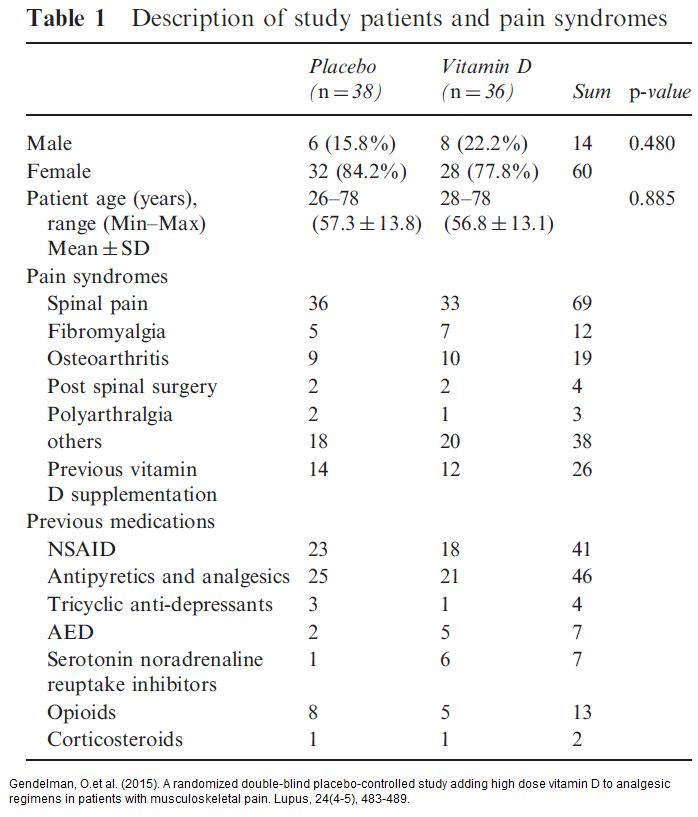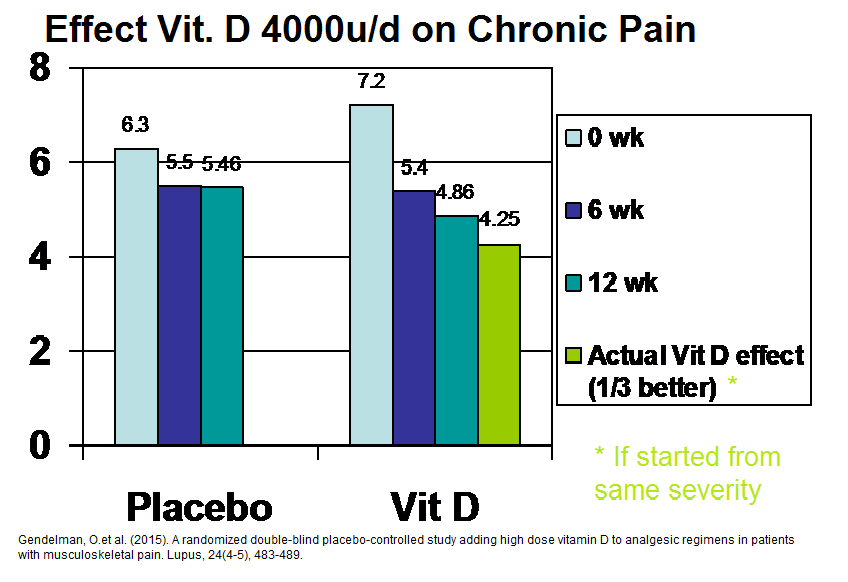4000 u/d vitamin D lessening Chronic Musculoskeletal Pains
Lupus. 2015 Apr;24(4-5):483-9. doi: 10.1177/0961203314558676.
A randomized double-blind placebo-controlled study adding high dose vitamin D to analgesic regimens in patients with musculoskeletal pain.
Gendelman O(1), Itzhaki D(2), Makarov S(3), Bennun M(3), Amital H(4).
http://www.ncbi.nlm.nih.gov/pubmed/25801891
- Their investigation concluded musculoskeletal pain at 30% population
- Found 73% vitamin D deficiency in the chronic pain group
- Their patient types – diverse:
- Results:
- They measured inflammatory compounds and found they decreased with treatment – “TNF α levels decreased by 54.3% in the group treated with vitamin D and increased by 16.1% in the placebo group. PGE2 decreased by39.2% in the group treated with vitamin D and increased by 16% in the placebo group. LTB4 levels decreased in both groups by 24% (p<0.05).”
- They felt the improvements seen were due to decreased cytokine levels.
- I am not sure if the only ones who responded were deficient but all cases where I live have at least a mild deficiency unless taking supplements. Study comes from Israel and vitamin D deficiency is rampant in middle east (they cover up) so… I have written and asked them if thought response related to deficiency.
Comment – a drop of 1.2/10 versus placebo is clinically significant as Cymbalta (duloxetine). Combine with high dose B12 maybe some people could in some cases achieve 1/3 improvement in their pain. Offers exciting possibilities as chronic pain sufferers (esp old) do not tolerate traditional meds well. I also check androgen levels (lack of sleep and opioids makes it makes it go down) and replace that as well – that definitely helps. There is more available now. For the old and infirm, new options are accumulating where none were.
In a separate article:
J Clin Rheumatol. 2015 Apr;21(3):126-30. doi: 10.1097/RHU.0000000000000233.
Vitamin d status and its association with quality of life, physical activity, and disease activity in rheumatoid arthritis patients.
Raczkiewicz A(1), Kisiel B, Kulig M, Tłustochowicz W.
http://www.ncbi.nlm.nih.gov/pubmed/25807091
“Vitamin D deficiency is highly prevalent in RA [Rheumatoid Arthritis] patients and is associated with higher disease activity and worse QoL [quallity of lilfe] indices



Pingback: Reaching “Critical Mass” to Achieving Pain Control – Procedure Pearls | Pain Medical Musing
Pingback: Reasons Why Vit D Helps Chronic Pain Coming Clearer – Vit D Genes | Pain Medical Musing
Pingback: Mulople Sclerosis (MS) Pain Treatment Options | Pain Medical Musing
Pingback: A Multisystem Disease Problem Case | Pain Medical Musing